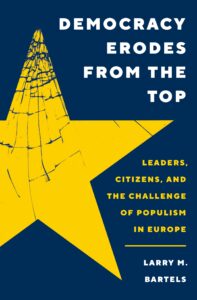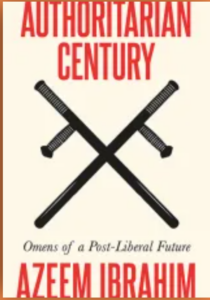Prominent American political scientist Larry Bartels insists that democracy withers from above, says analyst Ivan Krastev; unfortunate coalition policies or institutional changes are really why the far right comes to power.
In Democracy Erodes From the Top Bartels argues that the commonplace idea that a populist tsunami is destroying European democracies is empirically wrong. He has shown that public support for far-right policies and ideas has not changed much in the last 20 years, and there is no evidence that public opinion has moved to the right, Krastev writes for the FT:
 Both the social scientist Bartels and the board game designers of Secret Hitler agree that the biggest challenge for mainstream parties is not the strength of a society’s fascist orientation, but the degree of “liberal confusion”— and their attendant failure of political judgment. …. While history teaches us that Hitler was a savage revolutionary, drunk on power, the board game suggests that the new dictator might be the one most inclined to support liberal policies (because of the need for liberal votes in order to be elected chancellor). Thus, we don’t always know who might be a fascist before they are in power.
Both the social scientist Bartels and the board game designers of Secret Hitler agree that the biggest challenge for mainstream parties is not the strength of a society’s fascist orientation, but the degree of “liberal confusion”— and their attendant failure of political judgment. …. While history teaches us that Hitler was a savage revolutionary, drunk on power, the board game suggests that the new dictator might be the one most inclined to support liberal policies (because of the need for liberal votes in order to be elected chancellor). Thus, we don’t always know who might be a fascist before they are in power.
In his ‘Authoritarian Century: Omens of a Post-Liberal Future’, Azeem Ibrahim argues that the ongoing authoritarian and populist backlash to liberalism is rooted in the fragile core of the liberal project itself, notes Princeton’s G. John Ikenberry.
A liberal society is ultimately a “work in progress,” but its legitimacy rests on its continuous movement toward the ideals of openness and pluralism, he writes for Foreign Affairs:
 The problem, Ibrahim claims, is that this model is always threatened by reactionary forces that do not want to live in an open, multicultural society and by critics who doubt that liberalism can guarantee sufficient progress. The failings of liberal democracy—including the corruption of elites, inequality, and economic stagnation—have led to a loss of faith in public institutions and a dangerous creeping rejection of the entire model of liberal society.
The problem, Ibrahim claims, is that this model is always threatened by reactionary forces that do not want to live in an open, multicultural society and by critics who doubt that liberalism can guarantee sufficient progress. The failings of liberal democracy—including the corruption of elites, inequality, and economic stagnation—have led to a loss of faith in public institutions and a dangerous creeping rejection of the entire model of liberal society.
“The ideological core of liberalism is that all human beings have equal inherent moral worth and that, therefore, they must all have their dignity equally recognized and be given freedom to pursue their own well-being and interests,” Ibrahim contends, “at least in so far as it does not interfere with anyone else’s ability to do the same.”







